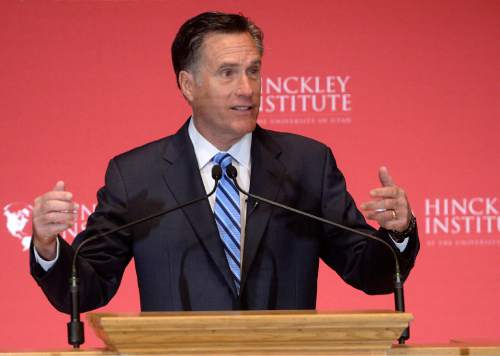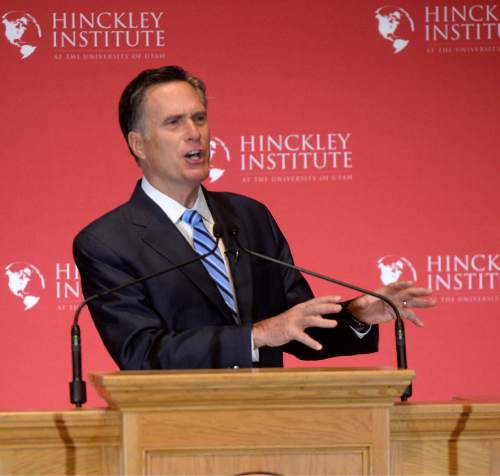This is an archived article that was published on sltrib.com in 2016, and information in the article may be outdated. It is provided only for personal research purposes and may not be reprinted.
Washington • The share of U.S. Mormons who identify as Republicans has dropped sharply this year compared with 2012, when Mitt Romney headed the GOP ticket, with less than half the LDS faithful now saying they align with the GOP, a new study shows.
More than 60 percent of members of The Church of Jesus Christ of Latter-day Saints said in 2012 that they were Republicans; now 48 percent say the same, according to the Pew Research Center, which conducted interviews with 8,000 Americans for its study of voter identification.
Pew also found that Mormons who say they lean Republican, or count themselves as officially part of the Grand Old Party, still account for a large percentage, 69 percent, though that is down from 78 percent four years ago. About 24 percent of Latter-day Saints say they lean or consider themselves Democrats.
Observers chalk up the change in party alignment to two things: the Romney factor and the Mormon concern with GOP nominee Donald Trump.
"The Pew study shows in vivid detail the impact of two once-in-a-lifetime candidates for Mormons," says Kirk Jowers, former director of the University of Utah's Hinckley Institute of Politics and a Romney friend. "One candidate — active Mormon, saved the Olympic Games here in Utah — and one candidate who calls for a Muslim ban and has shown other signs of religious intolerance. The Pew study demonstrates the peak and the valley of Mormon Republicans."
Mormon adherents' allegiance to the Republican Party has ebbed and flowed over time, with a high of 80 percent of Latter-day Saints saying they were GOP members, or leaned GOP, in 1994 and 2011. About 60 percent of Mormons said they were Republicans or leaned that way in 1999, the lowest since Pew began polling on the issue.
Romney, who now lives in Utah, was the first Mormon to top a major-party ticket and defended his faith even as some suggested he could win the White House if he distanced himself from his Salt Lake City-based religion.
Trump, on the other hand, has questioned Romney's devoutness and was trounced in the Utah Republican caucus by Texas Sen. Ted Cruz, who snatched nearly 70 percent of the vote. Trump grabbed 14 percent, behind Ohio Gov. John Kasich.
David Campbell, a political science professor at Notre Dame who has studied Mormons' political leanings, says that for most people, party affiliation isn't fleeting and they have more deep-seated beliefs than to switch every election.
"However, we can see in the data that unless there was this big influx of new Mormons or something, some Mormons must be changing in the moment which party they may prefer," Campbell says. "Clearly there is some share of the Mormon population that is moving away from the Republican Party, and Trump is undoubtedly a major factor but probably not the only one driving that."
Campbell says over time, since Pew began its polling, you can see a drop-off of Mormons lining up with the Republican Party, though that hasn't translated into Democratic gains.
"That is just further evidence what you've really got is fence sitters, if you will, and some of them will shift into the Republican column and out of the Republican column but they're not shifting to the Democratic column because that would be adopting an entirely different identity, one that they're not willing to do," Campbell says.
Since Pew began the study in 1994 that included Mormons, the LDS faithful identifying as Democrats or leaning that direction has never topped 33 percent and last year dropped to 15 percent, the lowest ever.
This year's study showed that 35 percent of Mormons say they are independent voters.





